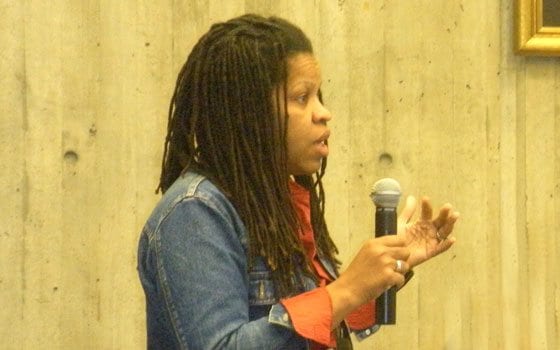
A group of concerned black citizens met with representatives from the Boston and Cambridge branches of the NAACP at Boston City Hall last Friday, hoping to coordinate a response to local public education issues.
Heading the list were the persistent achievement gap between white and minority students, and growing concerns about what the group’s members see as a lack of local-government support for inner-city schools.
“We want to get to a point where we know each other,” said Renae Gray, chair of the group called Black People for Better Public Schools (BP4BPS).
Led by Horace Small, director of the Union of Minority Neighborhoods, the meeting was held in the Curley Room at City Hall while Boston Public Schools Superintendent Dr. Carol R. Johnson attended a hearing in the City Council’s chambers. At the meeting, local parents, community activists, recent high-school graduates and members of the National Association for the Advancement of Colored People discussed the importance of working to improve the city’s public schools.
“We are out of time, out of resources and out of luck,” said Small. “If not us, then who?”
According to BP4BPS, Massachusetts has received $813 million in federal stimulus funds dedicated to education stabilization, much of which has gone to wealthy towns like Wellesley and Belmont. Despite having the largest amount of public schools in the Commonwealth, Boston has not received any of that money, the group said.
After explaining the reasons for the group’s creation, Gray opened the floor to suggestions from those in attendance about how BP4BPS could move from talk to action.
Carol Mallory-Causey, a resident of Mattapan, suggested a boycott of city schools starting in the fall.
“If the children don’t go to school, the administration doesn’t get paid,” Mallory-Causey said.
Steven Richards, a community economist and activist, focused on the financial feasibility of calling for school improvements, raising the question, “Where is the money going to come from?”
While action plans and voting are good ways to go about effecting change, Richards said, economic resources will be necessary to support the change that the group seeks. He also spoke briefly about a “closed loop economy,” an economic system that would allow the black community to become self-reliant, rather than dependent on outside sources of financial support.
Shaun Robinson, a recent graduate of the University of Massachusetts-Amherst, broached the idea of teachers living in the communities where they teach.
“We need more teachers who live in the community to teach at our community schools because they know and understand community culture,” said Robinson. “I remember a few times when my teacher would stop by my house to talk to my parents if I was acting up in school.”
Janine Quarles, a 2005 graduate of Boston Latin Academy, spoke about her experience in high school. “I was an underachiever because I didn’t receive the support I needed,” she said.
Quarles also stressed the importance of developing the next generation of community leaders, noting that there are young people who care about the community, but don’t know how to get involved.


![Banner [Virtual] Art Gallery](https://baystatebanner.com/wp-content/uploads/2024/04/Cagen-Luse_Men-at-store-e1713991226112-150x150.jpg)



